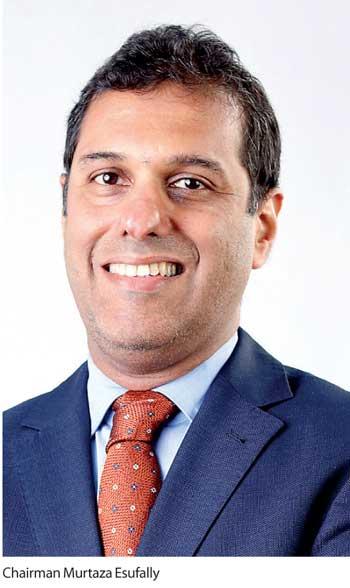Reply To:
Name - Reply Comment
 In a landscape where healthcare challenges are ever-evolving, Hemas Healthcare has emerged as a pillar of innovation and quality in Sri Lanka.
In a landscape where healthcare challenges are ever-evolving, Hemas Healthcare has emerged as a pillar of innovation and quality in Sri Lanka.
With roots dating back to 1948, Hemas has grown to become the largest private sector healthcare provider in the country. The company’s vast pharmaceutical network and internationally accredited hospitals highlight its dedication to accessible, high-standard care.
In an exclusive interview, Chairman Murtaza Esufally reflects on Hemas Healthcare’s journey, the strategic decisions that shaped its path and the commitment to improving Sri Lanka’s health sector.
Following are the excerpts from the interview.
Q:What has Hemas Healthcare’s journey been like since its inception?
The story of Hemas Healthcare is one of continuous evolution and a deep commitment to elevating the healthcare offering in Sri Lanka. Our roots began in 1948 as a distributor for Seven Seas, with the original business operating as a wholesale and retail druggist on Dam Street. This initial foray into pharmaceuticals not only established the Hemas Healthcare sector but laid the foundation for the entire Hemas Group.
 Over the past 75 years, the group diversified into few core areas, including consumer brands, when we collaborated with a French multinational in the 1960s. Thereafter in the 1970s we moved into the tourism sector. However, healthcare remained a constant focus and this culminated in Hemas becoming a public quoted company listed in the Colombo Stock Exchange in 2003.
Over the past 75 years, the group diversified into few core areas, including consumer brands, when we collaborated with a French multinational in the 1960s. Thereafter in the 1970s we moved into the tourism sector. However, healthcare remained a constant focus and this culminated in Hemas becoming a public quoted company listed in the Colombo Stock Exchange in 2003.
Hemas Healthcare in the health service sector truly took shape in 2008 with the establishment of Hemas Hospitals in Wattala, followed by the establishment of Hemas Hospitals in Thalawathugoda in 2013. We have since grown and in addition to the two hospitals, we boast of a comprehensive network of 27 labs and 16 collection centres, bringing quality healthcare closer to Sri Lankans nationwide.
In a strategic move to bolster domestic pharmaceutical manufacturing, we acquired J.L. Morison in 2013, later rebranding as Morison Limited. This acquisition facilitated our swift entry into the local production of oral medicines and consumer health products, including creams and lotions. We are proud to represent established names like AstraZeneca, Eli Lilly and Pfizer while fostering collaborations with reputable companies like Cipla, Zydus Cadilla, Kalbe Pharma, Getz Pharma, Abbott Laboratories, Roche and Terumo in recent years.
Q:What objective did you want to achieve as a business?
The core objective of the Hemas Healthcare sector has always been to make a positive impact on the lives of Sri Lankans. We strive to ensure that families across the country have access to affordable, high-quality healthcare.
This vision motivated us to address the critical issue of accessibility to secondary care. We observed a concentration of top-tier hospitals in Colombo, leaving residents in the suburbs of Colombo areas underserved.
The establishment of Hemas Hospitals Wattala and Thalawathugoda marked a significant step towards rectifying this disparity. We meticulously planned and designed these facilities to bring quality healthcare closer to suburban communities. While the Thalawathugoda location was initially seen as unconventional, our decision was based on a comprehensive understanding of regional healthcare needs in Asia. This choice was atypical in an industry heavily concentrated in Colombo.
Our commitment extends beyond hospital services. The acquisition of Morison allowed us to establish domestic pharmaceutical manufacturing, ensuring a reliable local supply of medication and strengthening the local healthcare ecosystem. This initiative, which has created a highly skilled workforce adhering to global manufacturing standards, also has the potential to pave the way for future exports.
For our Healthcare sector, empowering families and elevating Sri Lanka’s healthcare landscape are the cornerstones of our purpose. We leverage economies of scale to maintain competitiveness and affordability for patients. Additionally, we have invested in strong talent and technology within our operations, enabling us to pursue continuous innovation.
Profits are strategically reinvested to directly benefit patients through improved services or directed towards future initiatives that will enhance the overall healthcare experience for Sri Lankans.
Q:Our current healthcare environment, especially the pharmaceutical sector, has been volatile in recent times. What is your take on the present situation?
The current situation in the Sri Lankan pharmaceutical sector presents a complex challenge. The vital role of the National Medicines Regulatory Authority (NMRA), inadequate staffing and insufficient funding and resources have rendered the regulatory authority handicapped in serving the public and effectively regulating the industry.
With public health funding hovering below 1.5 percent of GDP, the risk of substandard medications entering the system is a significant concern. While the NMRA leadership is commendable, increased resources are crucial to strengthen regulatory oversight.
As a local pharmaceutical manufacturer, our buyback agreement with the Health Ministry for medicines ends this year; yet, we still don’t know what the government’s post-2024 plan is. Predictability and consistency in policy are paramount for planning and ensuring a stable supply chain.
A sustainable pricing formula that adjusts for fluctuating foreign exchange rates would be highly beneficial for the Sri Lankan pharmaceutical sector. Additionally, digitising operations and maintaining consistent policies across the entire pharmaceutical ecosystem would create a win-win situation for manufacturers, distributors and ultimately, patients. The pricing model must balance the cost of drug development and manufacturing with the need for affordability, including price caps for essential medicines.
Regulatory reforms for faster and more transparent approvals are vital to instil confidence in investors, manufacturers and global brands, ensuring they remain in Sri Lanka. An integrated digital platform for the NMRA, SPC and MSD would significantly enhance transparency and efficiency.
Furthermore, establishing a robust National Quality Assurance lab to ensure that all pharmaceuticals, whether imported or locally manufactured, meet stringent safety and efficacy standards is crucial.
The relatively small size of the Sri Lankan market has led some global pharmaceutical companies to question the need to remain in the country, resulting in the withdrawal of providers of high-quality medical products.
Q:What role does technology play in your operations?
Technology plays a transformative role across the Healthcare sector operations. We prioritise investments in digital solutions to enhance patient care, streamline processes and optimise resource allocation.
In our hospitals, electronic medical records (EMRs) have become a cornerstone of inpatient care, ensuring secure storage of patient data, including medical histories and other vital details. We aim to extend this to our out-patients as well.
Within the pharmaceutical sector, technology adoption has significantly improved our supply chain and demand forecasting, ensuring better stock availability and reducing waste.
The state-of-the-art Morison manufacturing plant in Homagama is one of the best facilities in Sri Lanka with the latest technology. The facility comprises of the latest equipment with minimum human interaction, dedicated air handling units, a zero liquid discharge effluent treatment plant and modern laboratories with the quality management system on par with international standards.
Q:What steps have you taken to ensure business sustainability in the healthcare space?
Ensuring business sustainability in a dynamic healthcare landscape requires a multi-pronged approach.
We closely monitor global advancements to ensure our product portfolio remains relevant and caters to evolving patient needs. We actively disseminate knowledge of these advancements to our healthcare professionals, empowering them to deliver the most up-to-date treatments.
In addition, we prioritise affordability without compromising quality. We understand the economic realities faced by Sri Lankan families and strive to make our treatments accessible to a broad patient base by making available a wide choice of medicine, diagnostics and surgical items.
Q:How can the healthcare sector in Sri Lanka improve? What are the opportunities?
The aging population, the growing incidence of non-communicable diseases and the government’s limitations in addressing all healthcare needs of our communities make the private sector vital in providing healthcare products and services in Sri Lanka.
Revitalising the country’s traditional primary care system offers another avenue for significant improvement. Strengthening the once robust GP network through strategic interventions, such as financial and logistical support, would allow GPs to dedicate more time to patients and maintain comprehensive medical records. Empowering GPs would not only enhance the quality of primary care but also alleviate the pressure on the secondary and tertiary healthcare facilities, creating a more efficient and streamlined system.
Continued support for the local manufacturing industry is crucial, including the renewal of the guaranteed buy-back agreement with the government and the removal of taxes on packaging material for local pharmaceutical manufacturers.
The private sector is also essential in providing services that the public sector, due to limited resources, cannot adequately offer, such as high-quality aged care services, fertility services, cosmetic surgery and mental health support.
Local pharmaceutical manufacturing requires support services like active pharmaceutical ingredients and high-quality lab testing. It is also important for Sri Lankans to see a notional bill of the costs the state incurs for their healthcare, helping citizens appreciate the high expenses involved in patient care.
The recent wave of healthcare professional migration necessitates a focus on upskilling the Sri Lankan workforce. Investing in targeted educational programmes for nurses, paramedics and allied health workers is crucial to address the emerging skill gap.
The future of Sri Lanka’s healthcare sector lies in embracing technological advancements, training healthcare professionals and maintaining a balance between local medicine manufacturing and creating a supportive environment. Artificial intelligence and digital data analytics hold immense potential to transform healthcare delivery by delivering personalised care plans, improving diagnostic accuracy and streamlining healthcare processes. Integrating these advancements into the healthcare ecosystem will create a more efficient, patient-centric system that delivers exceptional care.
Investing in these key opportunities will enhance the quality of healthcare for Sri Lankans and position the country as a leader in innovative healthcare solutions within the region. This forward-thinking approach will ensure a healthier future for all Sri Lankans.